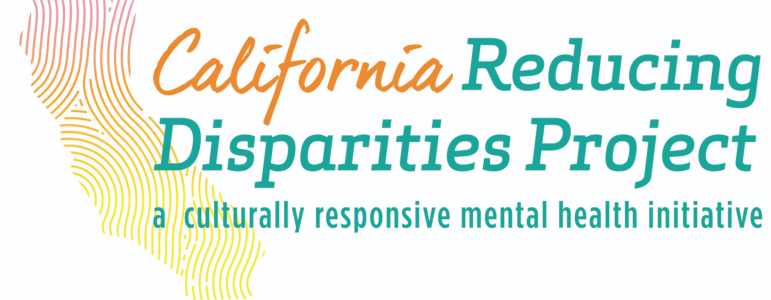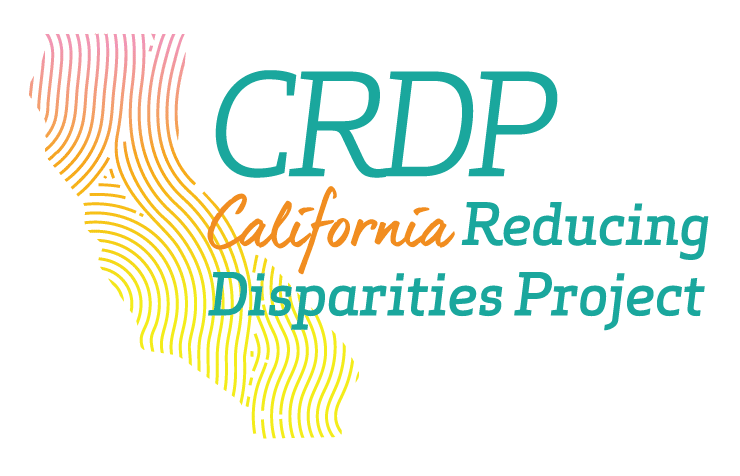The California Reducing Disparities Project (CRDP) is a culturally responsive mental health initiative.
This groundbreaking community driven and data informed Prevention and Early Intervention (PEI) initiative is funded by the voter-approved Mental Health Services Act (MHSA) in 2004. The initiative is administered by the Office of Health Equity (part of the Community Development and Engagement Unit) at the California Department of Public Health (CDPH). The MHSA opened doors to a new generation of culturally responsive mental health procedures and policies and led to the creation of the CRDP.
Although the intentions and goals of this new state funding is destined for historically disenfranchised communities (including communities of color and the LGBTQ+ community), many mental health advocates and providers noticed those very communities were still experiencing substantial barriers to culturally responsive care. Additionally, many disparities continued to persist as the voices and perspectives of these communities’ members were not involved in the development of strategic solutions.
These trends urged former U.S. Surgeon General David Satcher’s call for national action to reduce mental health disparities, the former California Department of Mental Health (DMH), with support from the Mental Health Services Oversight and Accountability Commission (MHSOAC), the California Mental Health Directors Association (CMHDA) and the California Mental Health Planning Council (CMHPC), created a statewide policy initiative to identify solutions for historically unserved, underserved, and inappropriately served communities.
For more information about ongoing community initiatives, visit:
While serving in her capacity as Chief of the Office of Multicultural Services at the California Department of Mental Health (now defunct), esteemed mental health practitioner and community advocate Rachel Guerrero, led the charge to make a movement in California geared towards solving this issue. By means of both public and private statewide advocacy, she blazed a trail that would ultimately become the California Reducing Disparities Project.
Here are her reflections on her on-going work and impetus to start this movement:
“A goal of this project was to build a new body of knowledge coming from these communities. The intended goal was that these communities get the services they need and can most benefit from, and designed by communities that look like them and understand their needs…There had already been lots of research and documentation of why these problems existed. The project was designed to move beyond the defined problems and fund a vision toward new solutions and new approaches.
“This project was seeking to grow new evidence to address the historical disparities in care and in research. It was designed as a community investment in growing new community-based evidence, from a Community Participatory Research approach.
“We sought to begin to add to evidence through the evaluation of projects these communities said were effective…But I had no evidence back then! At that time, the Mental Health sector was headed toward funding only “Evidence Based Practices”.
“Unsurprisingly, our communities also had large disparities in this. ‘Whose Evidence?’ was a popular response. We pushed back on the idea of implementing evidence-based programs not based in our communities. This was another successful advocacy approach for creating the CRDP.”
– Rachel Guerrero, LCSW Co-chair, CDEP Integration Advisory Group
This statewide initiative is an effort aimed at reducing behavioral health disparities among five of the most underserved and inappropriately served communities: African American/ Black, Asian Pacific Islander, Latino/ Latinx, LGBTQ+ and Native Americans.
Now in Phase II, the CRDP will focus on funding and evaluating the community defined solutions identified in Phase I, as well as advancing the strategies outlined in the CRDP Strategic Plan. There has not been a project of this scope before; one that recognizes and elevates community practices and identifies strategies for systems change. Throughout this process, California will present this work on the national stage so that other states can learn from our efforts. In all CRDP will award $60 million to 42 contractors and grantees over six years. The CRDP is funded by the Mental Health Services Act (Proposition 63) that was passed in November 2004. This act imposes a one percent income tax on personal income in excess of $1 million. –Office of Health Equity, California Department of Public Health




